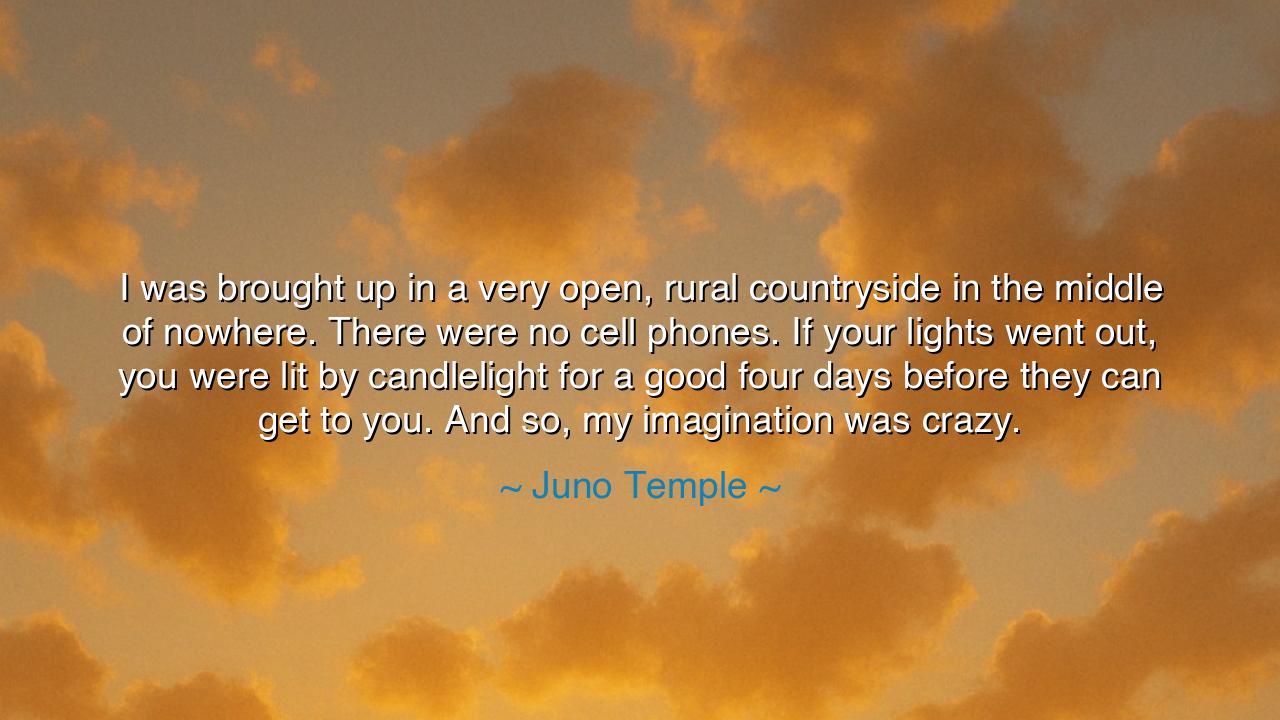
I was brought up in a very open, rural countryside in the middle
I was brought up in a very open, rural countryside in the middle of nowhere. There were no cell phones. If your lights went out, you were lit by candlelight for a good four days before they can get to you. And so, my imagination was crazy.






O children of the earth, gather now and listen to the words of Juno Temple, whose upbringing in the quiet solitude of the rural countryside reveals the profound connection between isolation and the flourishing of the imagination. She said, "I was brought up in a very open, rural countryside in the middle of nowhere. There were no cell phones. If your lights went out, you were lit by candlelight for a good four days before they can get to you. And so, my imagination was crazy." These words speak to the power of simplicity and solitude in shaping the creative spirit. Temple’s childhood, far removed from the noise and distractions of modern life, allowed her imagination to roam free, unbounded by the constant pull of technology and the chaos of the urban world.
The rural countryside, O children, is not just a place of physical beauty—it is a place of mental clarity. Temple speaks of an environment where silence reigns, where nature is the loudest sound, and where the absence of distractions opens up a vast space for the mind to wander. In such an environment, the imagination flourishes. The lack of technology, of cell phones, forces the mind to turn inward, to create worlds of its own, to dream, to invent, and to explore. Without the constant buzz of modern devices, one is left to rely on the mind’s eye, and in this reliance, the imagination becomes something wild and free, a force to be reckoned with.
Consider, O children, the example of ancient philosophers who, too, sought solitude in nature to expand their minds and imagine new worlds. Socrates would walk the streets of Athens, conversing with anyone willing to engage, but he also spent time in quiet reflection, deep in thought. Plato, his student, found inspiration in his travels through the Mediterranean, in the quiet study of the world around him. They did not have the distractions we have today; their imagination was shaped by the natural world and their own inner reflections. In the same way, Temple's isolation in the countryside allowed her to nurture her creative spirit, her mind undistracted by the demands of technology and the bustle of city life.
Temple's reference to candlelight speaks to the power of darkness and stillness in fostering imagination. When the power went out, and the world was left in darkness, there was no choice but to sit in the quiet and imagine. In the quiet of the night, with only the flickering light of candles, the mind is free to roam, to explore ideas, and to create. It is in the absence of external light that the inner light of the mind can shine most brightly. Just as the stars are best seen in the darkness of the night sky, so too is the imagination most vivid when there are no distractions to dim its glow.
This power of solitude and simplicity has been recognized throughout history. In the Middle Ages, monks and scholars would retreat to remote monasteries to find peace and focus. They knew that in isolation, free from the noise of the outside world, their minds could expand and explore the deep mysteries of life and faith. Thomas Aquinas, the great theologian, spent years in seclusion, thinking, writing, and dreaming. It was in that solitude that he produced some of his most profound work. Like Temple, he understood that the absence of modern distractions allows the mind to connect to something greater—whether it be the divine, the creative spirit, or the very essence of existence.
In the same vein, O children, the lesson is clear: there is a sacredness in simplicity, a power in solitude, and a richness to the imagination that arises when one is freed from the noise and demands of modern life. In our busy world, with its constant hum of technology and instant communication, it can be difficult to hear the quiet voice of our creativity. But Temple's words remind us that the most profound ideas often come from silence, from times of stillness and reflection. Whether it is in the woods, by the sea, or in the quiet of our homes, we must make space for our minds to wander, to dream, and to create.
So, O children, take this wisdom to heart. In the hustle and bustle of modern life, let us find moments of peace and solitude where we can connect with our own imagination. Let us not be afraid of stillness, for it is in these moments that our creativity is born. Take time to sit in silence, to look out at the world with open eyes, and to allow your mind to roam. You need not live in the middle of nowhere to embrace this. It is in your own heart and mind that the power of the imagination lies, waiting to be discovered.
Embrace solitude, O children, and let your imagination flourish in the silence. The world is full of noise, but it is in the quiet that the true magic of the mind is found. Whether you are in the heart of the city or the quiet countryside, remember that the greatest inventions, the most profound ideas, and the most beautiful works of art are born in the stillness of the mind, free from the distractions of the world. Let your imagination be the light that guides you through the dark.






AAdministratorAdministrator
Welcome, honored guests. Please leave a comment, we will respond soon